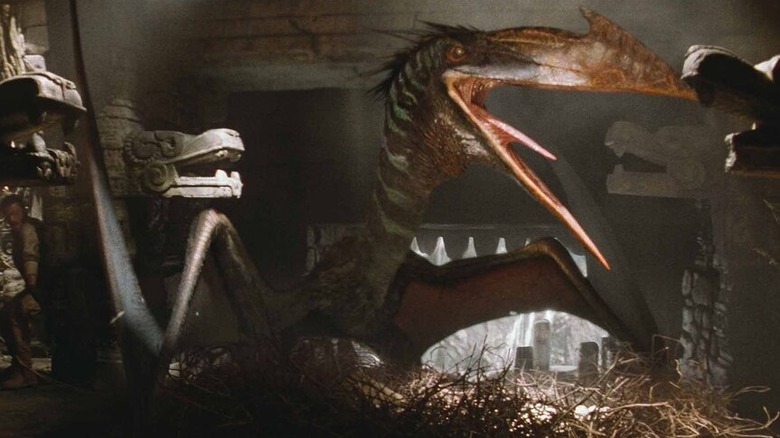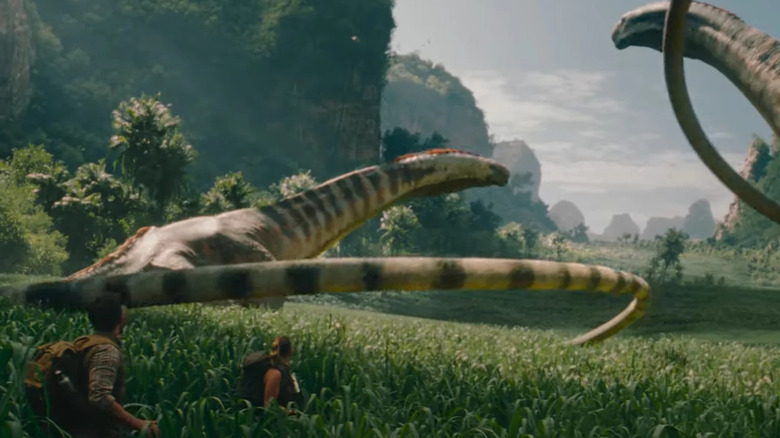In Steven Spielberg’s groundbreaking 1993 blockbuster “Jurassic Park,” the billionaire behind the titular hoped-for attraction, John Hammond (Richard Attenborough), is virtually buzzing with giddy anticipation at how profitable his enterprise will seemingly turn into. He crows that his crew who helped convey dozens of extinct species of dinosaurs again to life “spared no expense,” and that all the pieces within the park boasts “completely spectacular designs.” Though the small group of consultants Hammond has invited to tour the park are certainly impressed with what he is finished, having robust emotional responses to the sights of precise dwelling dinosaurs strolling the Earth, they start to have critical doubts as actuality begins to set in. Dr. Ian Malcolm (Jeff Goldblum) sums up the potential folly of Jurassic Park succinctly: “Your scientists have been so preoccupied with whether or not or not they might, they did not cease to suppose if they need to.”
“Jurassic Park,” each the primary film and Michael Crichton’s supply novel, makes use of the concept of a possible dinosaur theme park as a metaphor for all method of foibles surrounding the progress of science and know-how, significantly humanity’s penchant for leaping earlier than it appears to be like. It is half Mary Shelley, half “Westworld,” half “King Kong,” and the movie not solely turned a smash hit, however helped solidify the usage of Pc Generated Imagery in cinema. Just some years later, CGI had turn into a staple in practically each style film, with big developments and refinements to the tech taking place with every passing 12 months.
But as Claire Dearing (Bryce Dallas Howard) explains in “Jurassic World,” the general public’s urge for food for extra and higher issues is insatiable as soon as whetted. Whereas the “Jurassic” franchise took plenty of conceptual turns and added a number of new characters to the combo (to not point out that includes a brand new dino or two with every sequel), there is not any doubt that the great curiosity and love garnered by the primary movie has waned. The newest entry, “Jurassic World Rebirth,” appears to acknowledge this, metaphorically evaluating the gradual extinction of the reborn dinosaurs to the creeping demise of the movie trade. Satirically, in each instances, now we have “Jurassic Park” to partially blame.
Jurassic Park Rebirth acknowledges that the magic of visible results is all however gone
The world-building in “Rebirth” follows on from the prior “Jurassic World” trilogy that author/director Colin Trevorrow and his collaborators made. In these movies, the genetically engineered dinosaurs initially developed for Hammond’s deserted park on Isla Sorna and the next Jurassic World resort have been finally unleashed onto the whole planet. For a time, these creatures seemed to be cohabitating with people and different animals. The trilogy appeared to be carrying on a central metaphor for the dinos that Spielberg had begun with “The Misplaced World: Jurassic Park,” which is that they seem to be a stand-in for animals and the pure world on the whole. The movies advocated for normal conservation and preservation of the dinosaurs, with Malcolm’s chaos principle made manifest in the way in which that the whole world was now compelled to reckon with these new species.
“Rebirth” provides a brand new wrinkle to all this, as author David Koepp begins the movie with a title crawl which explains that almost all of dinosaurs have begun to die out because the occasions of “Dominion.” The creatures are actually succumbing to too many variations in Earth’s fashionable local weather than the prehistoric local weather they have been initially used to (a plot level which echoes H.G. Wells’ “The Conflict of the Worlds,” one adaptation of which was made by Koepp and Spielberg in 2005). Though the dinosaurs are nonetheless capable of reside in areas near the Earth’s equator (which mimics their conventional local weather shut sufficient to permit them to thrive), the decline of the dinos is made much more tragic and acute by the truth that public curiosity in them has waned now that the whole world has turn into used to their presence. The movie’s opening sequence exhibits how a Brachiosaurus, as soon as the supply of awe for Alan Grant (Sam Neill) and Ellie Sattler (Laura Dern), has turn into a mere incidental highway hazard inflicting a site visitors jam.
It is a deft visible metaphor on behalf of Koepp and director Gareth Edwards, a picture nearly as good as any to point how what as soon as was thrilling and novel has turn into commonplace for jaded audiences. Mixed with the lamentations of Dr. Henry Loomis (Jonathan Bailey) that attendance at his historical past museum has severely dropped off, Koepp and Edwards aren’t being delicate about how these dinosaurs are a stand-in for visible results in style films, if not for cinema on the whole. Just lately, there’s been plenty of dialogue about how movies have turn into much less of a draw for normal audiences, and whereas there are quite a few social and financial causes for this, Edwards and Koepp appropriately pinpoint the saturation and ubiquitousness of visible results movies as one key issue. How can any viewers be crammed with awe and surprise once more once they’ve been skilled on a long time of movies the place the results are, probably within the minds of a median viewer, made with the obvious push of some buttons?
How Jurassic Park Rebirth proposes to convey some surprise again to the films
After all, no visible results movies are made so merely as that standard knowledge would have it. A part of the issue is our lack of frequent language when discussing visible results, thus ensuing non-critiques corresponding to “the CGI appears to be like good/dangerous” changing into the peak of debate about them. One other drawback dealing with visible results is that, regardless of the massive quantity of effort and creativity that goes into their creation, too many administrators and producers have a lackadaisical “let’s do it in publish” mentality. It is a crutch that has resulted in some traditional strategies of trick images and different slight of hand illusions being both missed or forgotten, as my dialogue with David F. Sandberg about utilizing such gadgets on “Till Daybreak” demonstrates. All of this has contributed to a rising apathy towards the visions cinema can present, one {that a} examine of movie historical past solely exacerbates. As Edwards himself mentioned to Deadline on the purple carpet of “Rebirth,” most films that he considers masterpieces have been made previous to the unique “Jurassic Park,” indicating that technological progress is not essentially at all times an enchancment.
As such, Edwards and Koepp use “Jurassic World Rebirth” to attempt to make a case for a way visible results movies can nonetheless maintain the facility to thrill, entertain, and thrill the one manner they know the way: by utilizing pure cinematic craft. “Rebirth” shouldn’t be a gimmick movie; it would not function some type of new course of or tech that it is displaying off, neither is it making an attempt to commerce on a nostalgia issue by solely utilizing animatronic or sensible results. (Actually, it seems that “Rebirth” has no sensible dinosaurs, a notable distinction from nearly each earlier “Jurassic” movie.) As an alternative, the film depends on offering a real sense of scale, stakes, and suspense, the place it is not the visible results per se that astound, however the circumstances surrounding them and their presentation. In the course of the film’s virtually prerequisite “somebody sees a benign dinosaur and is awed” scene, “Rebirth” did one thing I assumed inconceivable: It made me emotional, instilling in me that feeling of surprise I assumed was gone from these films. It is all because of the manner Edwards shoots the scene, the way in which the VFX artists ship the animation of the dinosaurs, and the way in which Bailey performs the second. It’s, in brief, the magic of movie-making in motion.
That is clearly not sufficient for everybody, because the extra hostile reactions to “Rebirth” point out. For these of us, it appears familiarity has certainly bred contempt, as they reject yet one more “Jurassic” sequel. Whereas purely good filmmaking is sufficient for me and appears to be the one manner ahead for the “Jurassic” films ought to they proceed, there is not any query that future filmmakers ought to heed the warnings of “Rebirth” with regards to visible results. If we’re not cautious, the joy of the films might certainly die out, and this can be a medium that nobody ought to hope goes extinct.



